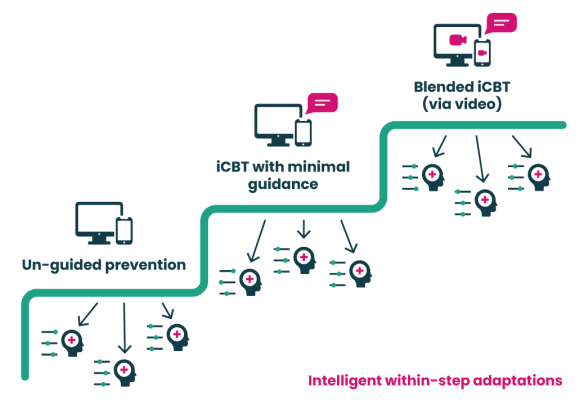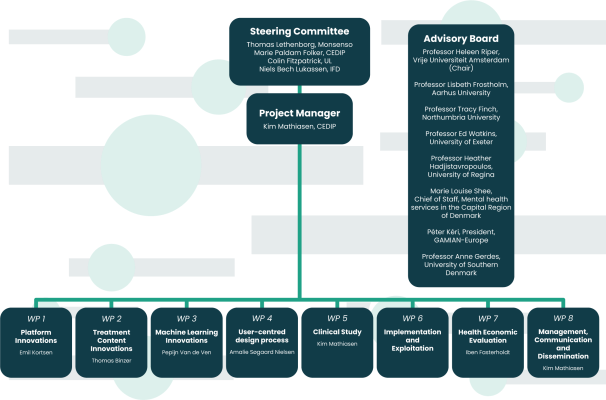Personalised digital treatment
Mental disorders, especially depression, accounts for a significant and growing proportion of disability, both nationally and internationally. Even so, few receive care, let alone evidence-based care. Although attempts have been made to mitigate this treatment gap, by the use of internet-based interventions, these have to a large degree either not been widely adopted or suffer from rigid one-size-fits-all service models. In order to truly move the field forward, Internet-based interventions must be as adaptive as face-to-face treatments.
PERSONAE aims to develop a scalable, data-driven matched adaptive care service for depression. By the use of multiple treatment modalities and intelligent data driven clinician and patient support systems, it will provide access to personalised, digital treatment for all, in a cost-effective manner.
Rethinking digital treatments
In order to achieve well-performing individually tailored digital treatment, it is necessary to rethink digital treatments as much more than just an intervention. Instead, it is necessary to design a full digital service model capable of meeting the needs of each individual patient. New innovative intimate digital interventions on mobile platforms must be combined with an adaptive service design model and must be supported by intelligent data driven decision support systems. In the PERSONAE project, we propose a radical new service, which integrates a matched care service design, mobile intimate interventions and data collection, adaptive treatment content, and artificial intelligence. Only by integrating all these elements, will we be able to truly harvest the potential of digital interventions for depression.
Project aim
The aim of the PERSONAE project is to combine cutting-edge individualised mobile intervention technologies including ease of use, high-resolution data collection and adherence enhancing technologies with a matched care service design and artificial intelligence for data driven automation and decision support systems. In short: digital matched and adaptive treatment for depression.
Value propositions
- Easy access to a scalable, personalized offer of CBT modalities
- Flexible, digital at-home treatment
- Faster access to treatment
- Efficient use of clinicians’ time
- Less time wasted on insufficient or inappropriate treatment
- Implementation in Danish mental health services immediately after the project ends via Internetpsykiatrien
- International commercialisation by the Danish SME, Monsenso
The project builds on:
- The previous successes of the ENTER research project
- Internetpsykiatrien
- The latest evidence-based interventions for depression
- The advances in mobile health technologies, remote patient monitoring
- Machine learning.
The project will design, develop and validate a service that demonstrates value for patients, clinicians and health care providers.
The PERSONAE project began 1st of May 2023.
Governance structure
WP 1: Platform innovations
The objective of this work package is to prepare the platform for delivering data-driven, digital, personalised matched care to patients and for recommending optimal care pathway to clinicians. The work will be based on the current Monsenso mobile health solution and the current sign-up and screening process being used for Internetpsykiatrien. The platform ensures the data collection fuelling the AI-algorithms, clinical and economic studies of WP 5, and 7 and it hosts the digital intervention programmes that patients are asked to follow.

Lead by Emil Kortsen,
Product Owner
Monsenso A/S.
WP 2: Treatment Content Innovations
The main purpose of work package two, Technical adaptations, is to develop and implement treatment content based on the program for adult depression from Internetpsykiatrien and the ENTER project and to adapt the patient administrative software. Moreover, the work package focuses on designing data structures for data collection and distribution among partners.

Team Leader, Thomas Binzer,
MSc.Eng. in Product Development & Innovation
Centre for Digital Psychiatry.

Assistant Leader,
Rikke Hellum
Project Manager
Centre for Digital Psychiatry
WP 3: Machine Learning Innovations
Work package three will leverage the rich data already available on our patient cohorts and further data collected during the study. This data will be used to:
- Create personalised patient models that will allow us to screen patients automatically and recommend the most suitable treatment and level within our stepped model
- Support patients and their caregivers with adaptive treatment suggestions throughout treatment
- Provide visualisations to provide patients and their caretakers with the reasons for the system’s recommendations, thus creating trust in the AI technology underpinning this work package.

Lead by Pepijn Van de Ven,
Professor,
University of Limerick.
WP 4: User-centred design process
The aim of the User Involvement work package is to ensure patients’ acceptance of and adherence to the treatment. The purpose of the user involvement is both to ensure that relevant problems are solved with the future treatment solution and to co-create how to solve the problems appropriately when designing and developing the solution.

Lead by Amalie Søgaard Nielsen,
Assistant professor,
Center for Digital Psychiatry.
WP 5: Clinical study
In this work package, the novel treatment concept will be evaluated for safety (negative effects), clinical effectiveness and adherence in comparison with the standard guided iCBT treatment at Internetpsykiatrien. In addition, secondary clinical measures will be analysed e.g. the level of therapeutic alliance and the role of co-morbid anxiety and or substance use. Ph.d. student on the RCT study is Trine Therese Holmberg Sainte-Marie, Centre for Digital Psychiatry and SDU.

Lead by Kim Mathiasen,
Associate professor,
Centre for Digital Psychiatry and SDU.

Trine T. H. Sainte-Marie,
Research assistant
Centre for Digital Psychiatry
WP 6: Implementation and Exploitation
The overall objective of the implementation and exploitation work package is to secure transferability of D-MAC and inform exploitation and further implementation processes in real-life settings.
WP 7: Health Economic Evaluations
The objective of the economic evaluation of digital adaptive matched care (DAMC) for patients with depression is to carry out a cost-effectiveness analysis based on the clinical study with data on patient level.

Lead by Iben Fasterholdt,
Senior Health Economist & Scientist in AI
CIMT.

Assistant leader, Nanna Bluhme
Research Assistant
CIMT
WP 8: Management, Communication and Dissemination
The purpose of work package eight is to ensure coordination and timely progression of the overall project and to communicate and disseminate the activities and results of the project.

Project Lead
Eskil Manley Welan,
Specialized Consultant
Centre for Digital Psychiatry and SDU.

Assistant Leader,
Rikke Hellum,
Project Manager
Centre for Digital Psychiatry.


